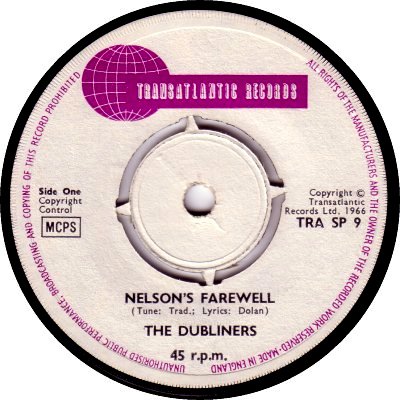
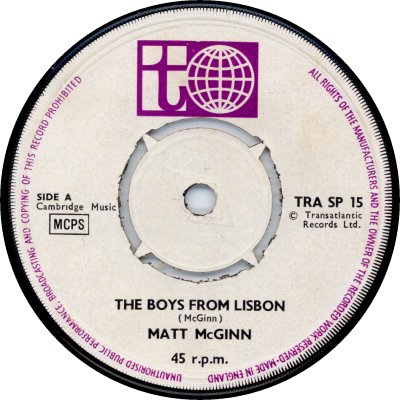
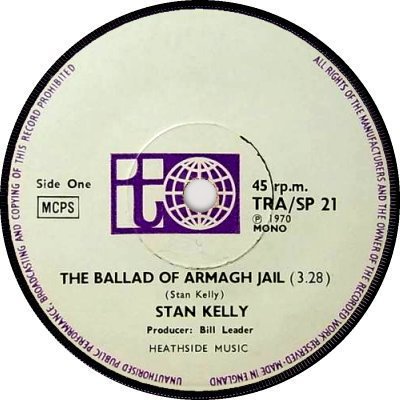
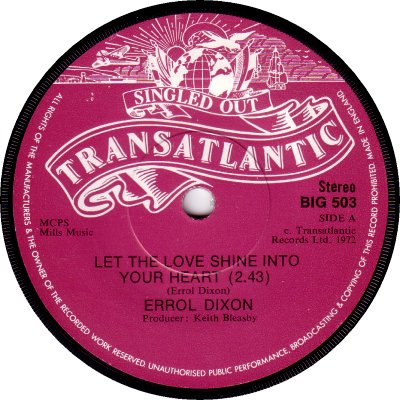
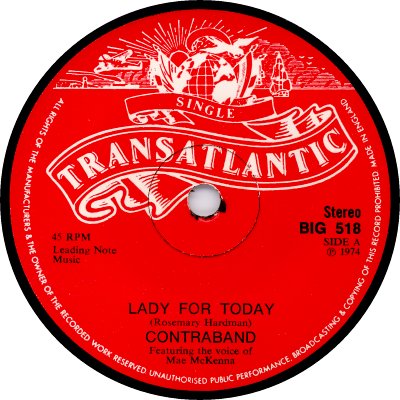
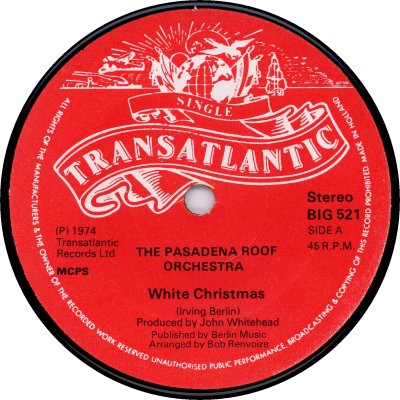
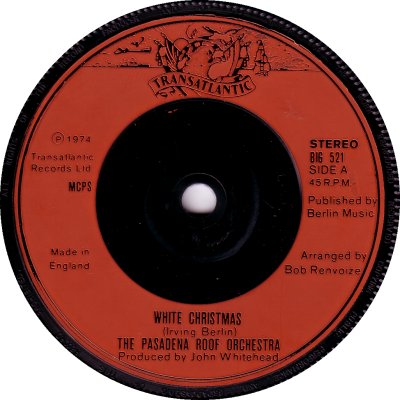
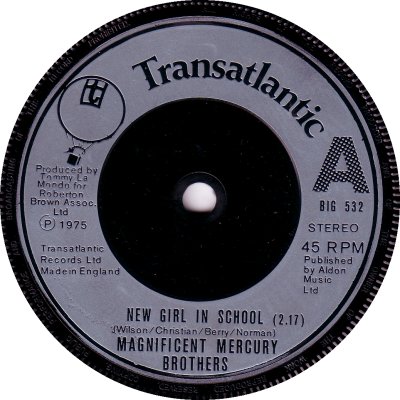
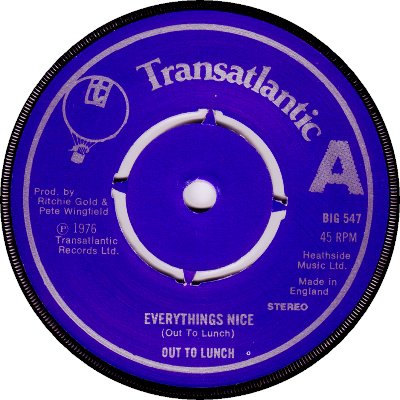
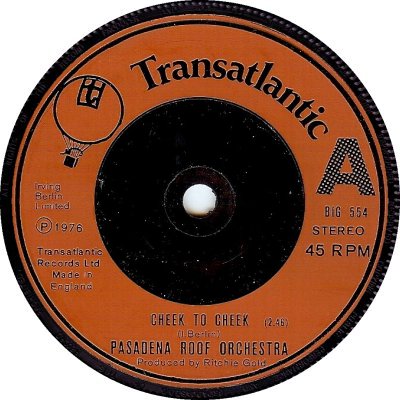
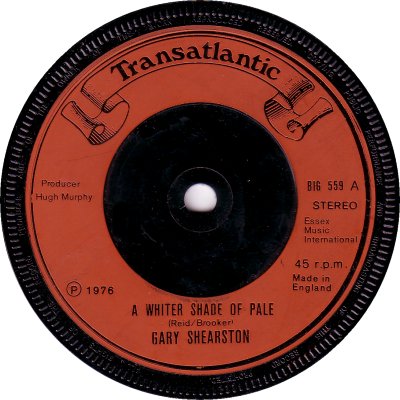
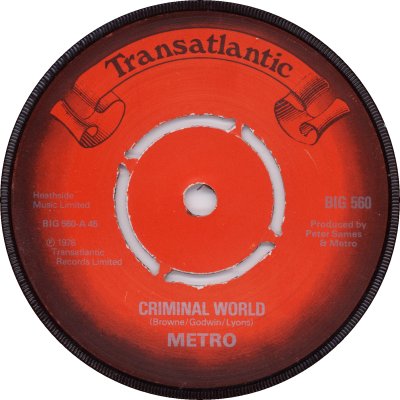
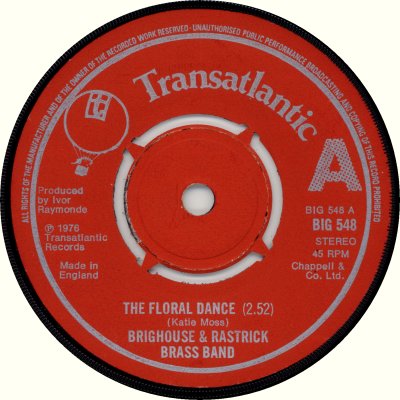
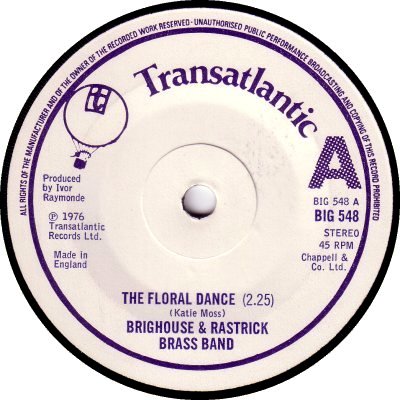
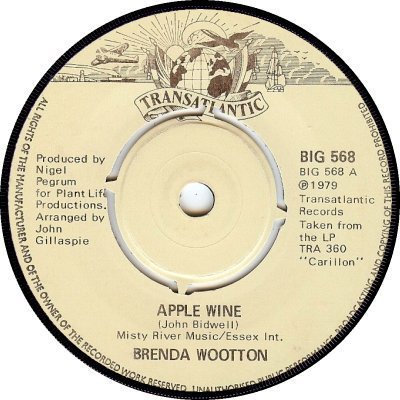
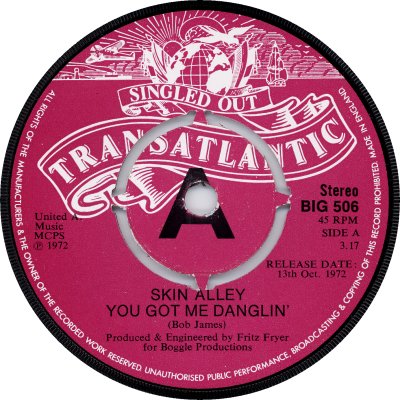
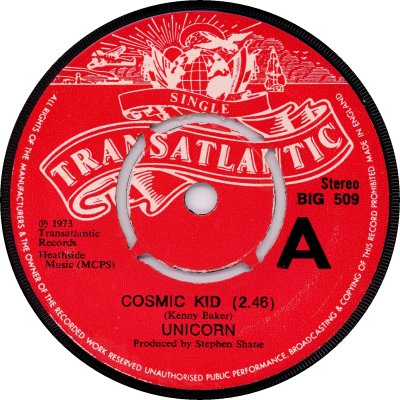
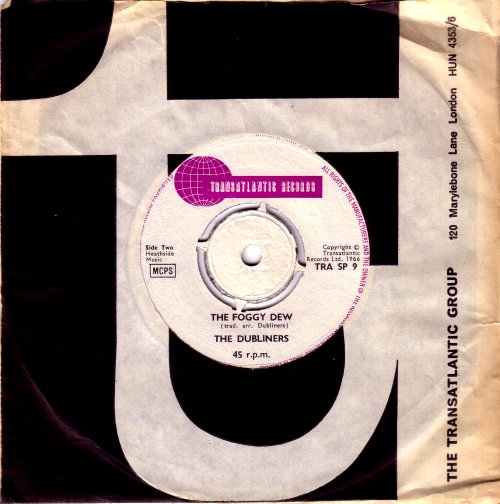
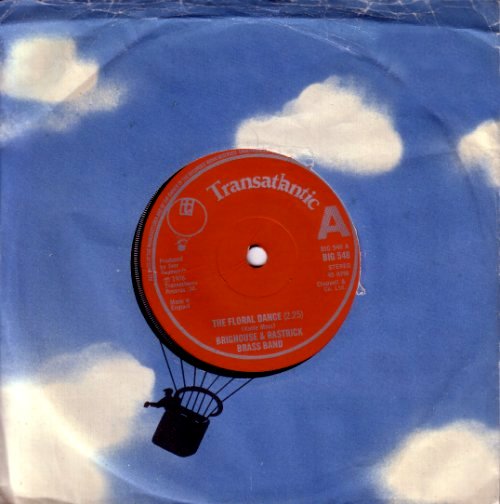
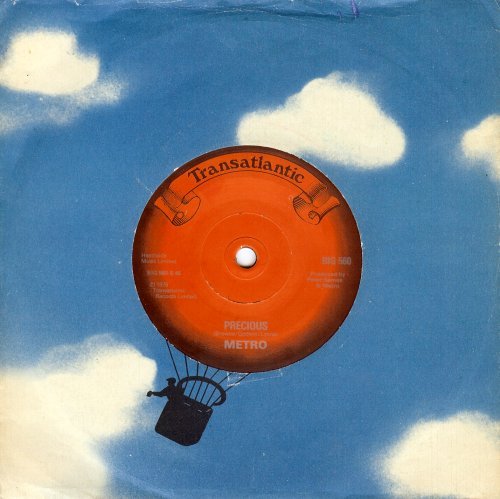
One of the earliest successful independent record companies in this country, Transatlantic was founded in 1961 by Nat Joseph purely as an import company, but it soon moved into the field of record production. After putting some money in the bank with a series of notorious but best-selling sex-instruction records the company moved on to less controversial and more musical ground, becoming a home for contemporary folk music, with such notables as Pentangle, the Dubliners, Ralph McTell and Bert Jansch on its books. Transatlantic's musical policy was dictated by Joseph's tastes, which over the years led to an eclectic catalogue of albums, with Folk-Rockers Decameron and Dransfield rubbing shoulders with 'Medieval-Prog' band Gryphon, Rock band Stray, and the Brighouse and Rastrick Brass Band. Joseph also leased and imported material from US labels: obscure Classical records from Nonesuch, Jazz from Prestige and Milestone, etc.
In 1975 Joseph sold 75% of Transatlantic to Granada. 'Music Week' of the 14th of June, commenting on the development, said that Granada had formed a new company, 'Granada Records Ltd', in order to take over Transatlantic, and that Joseph was retaining the remaining 25%. According to the article no changes of name or structure were to result from the deal. 'MW' of the 4th of September 1976 reported that Transatlantic intended to place more emphasis on the singles market, but sadly no Chart action resulted; the company wasn't to enjoy a hit single until late 1977, when the Brighouse & Rastrick Brass Band took its version of 'The Floral Dance' to an unexpected No.2 spot. Before then, there were troubled times to be negotiated. 'MW' of the 29th of January 1977 broke the news that Transatlantic had made big losses under its new owners, a deficit of £334,000 being recorded for the period 1975-76. Six months later came the news of personnel cutbacks; there were also rumours that Granada were considering selling the company, rumours that Nat Joseph - then serving as managing director - denied ('MW', 4th June 1977). Just over a month afterwards 'MW' of the 16th of July carried the news that Granada were negotiating the sale of Transatlantic and its publishing arm, Heathside Music, with publishers Marshall Cavendish. The article stated that the intention was for Transatlantic and Heathside to become part of Marshall Cavendish's 'O&H' group, which had been formed by ex-RCA executives Olav Wyper and Geoff Hannington; it would provide an outlet for Wyper and Hannington's unreleased Logo (q.v.) material. The company's name would be changed "in the fullness of time" but the Transatlantic label would be retained, mainly for back catalogue recordings. 'MW' of the 6th of August noted the departure of Nat Joseph; the issue of the 27th of August reported that the distribution operation was being closed down. Most Transatlantic acts were transferred to the Logo label; ironically the Brighouse & Rastrick Band single saw Transatlantic in the Singles Chart for the first and only time shortly afterwards. The very occasional Transatlantic record came out until 1981 when the label disappeared.
Transatlantic singles first appeared in the early '60s, on a white-and-purple label (1), with numbering in a TRA/SP-0 series; there was a separate TRA EP-100 series for EPs. The logo changed in 1966, with TRA SP-11 (2), and moved to the centre with TRA SP-21, in 1970 (3). 'Record Retailer' of the 16th of March 1967 reported that the company was to launch a new 'pop' label, 'Big T' (q.v.), at the end of that month, but that 'non-pop' material would continue to appear on the main Transatlantic label. In the event there weren't many of these 'non-pop' singles: just nine over the course of the next three years. In 1972, however, Big T was abandoned and the Transatlantic label was given new life as an all-purpose outlet. A new series of catalogue numbers was introduced, in the BIG-500s, along with a new label design. Initially this came in a pinky-purple colour (4); the colour changed to red (5) with TRA-509, and the legend in the banner shortened from 'Singled Out' to 'Single'. Copies of at least two singles, BIG-519 and 521, were pressed in Holland (6), thanks to a vinyl shortage. Towards the end of 1974 the paper label was replaced by an injection-moulded one (7), which was manufactured by Phonodisc. A change of design followed almost immediately, in early 1975, with the introduction of a balloon logo and a rather attractive company sleeve (8, 19); this design could also be found on paper labels (9), which look to have been sourced from Pye. For the most part these singles were coloured blue, but the odd red one appeared (10). 1976 saw a futher change of design: with BIG-556 the balloon logo went, to be replaced by a scroll (11); this time around red was the most common colour with blue only making an appearance every now and again. Most of the scroll labels were injection moulded Phonodiscs, but the occasional paper one (12) came out; the paper ones went well with the company sleeve (20). May 1977 saw a brief return to the balloon design, in blue, red or white paper labels (13, 14); while the final three issues, which were cream coloured, went back even further to the 'transport' logo (15). Promo markings seem to have been mainly restricted to a short period between October 1972 and May 1973, though they made a return during the Logo days: promos of BIG-507 had a central black 'A' and a release date (16); BIGs 507 to at least 511 had a black 'A' at 4 o'clock but no date (17); while BIGs 567 and 568 had RCA-style markings - a hollow central 'A' and a release date.
As an independent, Transatlantic turned to various companies for manufacture of its products. 'MW' of the 29th of August 1970 observed that a pressing and distribution deal had been signed with EMI, operative from the 1st of September, and noted in passing that until that point pressing had been done by CBS, British Homophone or Industrial Commercial Plastics, with Selecta and various members of the BIRD group handling distribution. The deal with EMI lasted for a couple of years. Transatlantic had been doing some of its own distribution since 1967, and had been building up its van sales since 1968; from the start of 1972 it increased the amount of its own product that it was handling to 70%, and then in July of that year it put its own distribution facilities into full operation and began offering a distribution service to other independents ('MW', 1st July 1972) - Clyde Factors were to distribute in Scotland, with Solomon & Peres and Irish Record Factors covering Ireland. Over the course of the next few years Transatlantic acted as distributor for a number of other labels - for example Chipping Norton, Pebble Beach, Jazz label Black Lion, and several Reggae labels such as Jama and Love (q.v. all). The same 'MW' article said that RCA was to take over responsibility for manufacture: RCA appears to have mainly pressed albums at its own plant, however, singles being generally farmed out to CBS, as was the case for most of RCA's own singles. 'MW' of the 14th of October stated that a 'licensing' deal had been struck with RCA for manufacture and distribution of Transatlantic's future singles releases; the deal called for twelve singles per year to be issued, with BIG-506 being the first.
The arrangement with RCA seems to have lasted for only a year or so; at some point in 1973 Transatlantic's pressings began to be done by a firm that I haven't as yet been able to identify, and for several years its singles failed to appear in 'Music Week' or 'The New Singles'. Subsequent to the unknown firm several different companies took on the manufacturing job. 'MW' of the 12th of October 1974 reported that Transatlantic's albums were being pressed abroad, as were some singles from that period; Phonodisc took up the baton around the start of 1975 and was responsible for the injection moulded records. Pye did a stint in 1976, then came more Phonodisc injection moulded labels. Transatlantics from the early part of the Logo period were pressed by mainly pressed by Decca and were distributed by Selecta; the Brighouse & Rastrick Band single can be found in a variety of contract pressings. The last few Logo-era records, from 1978 onwards, were manufactured and distributed by RCA. Thanks to Robert Bowes for scans 10 and 15, and to Nicholas Hough for scan 3.
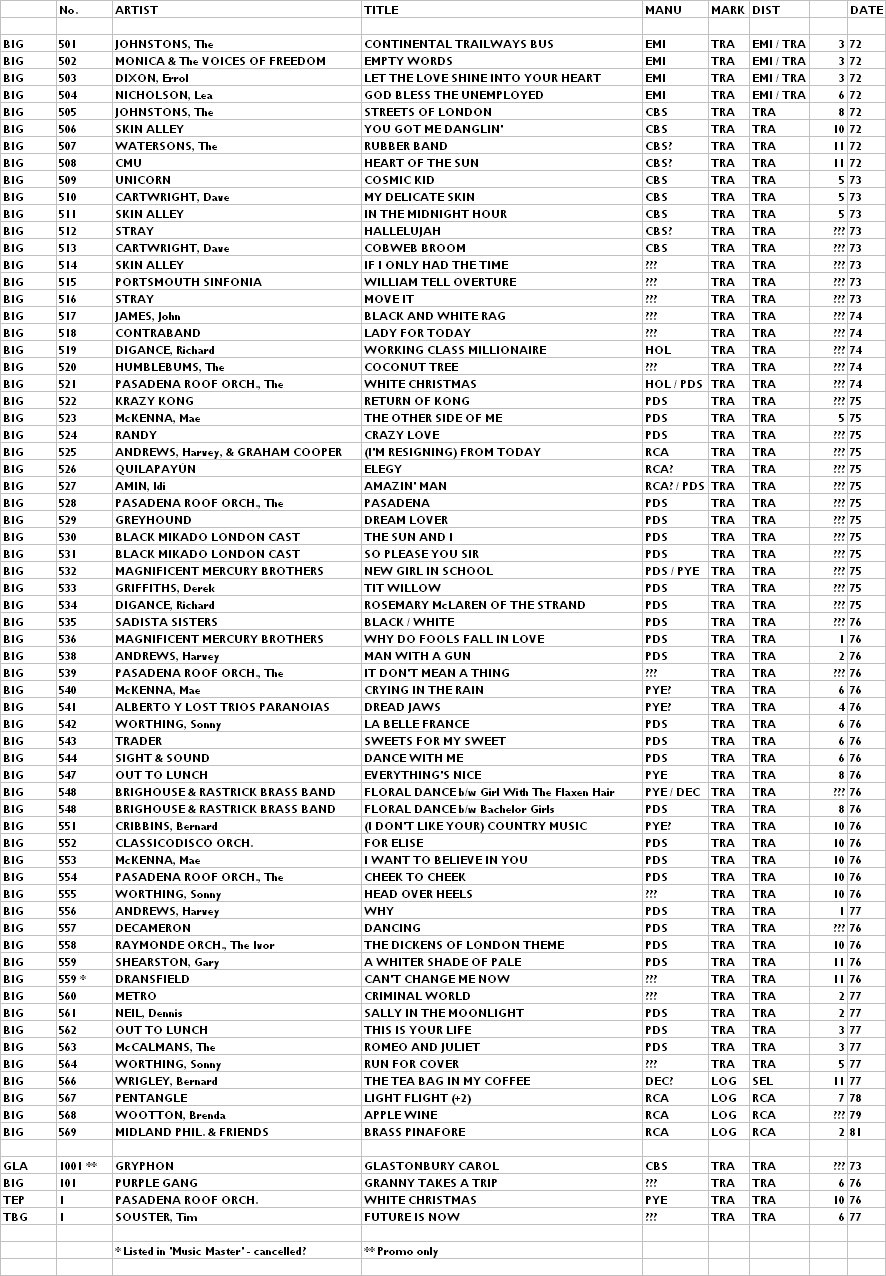


Copyright 2006 Robert Lyons.

